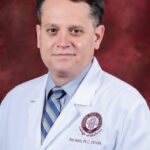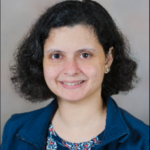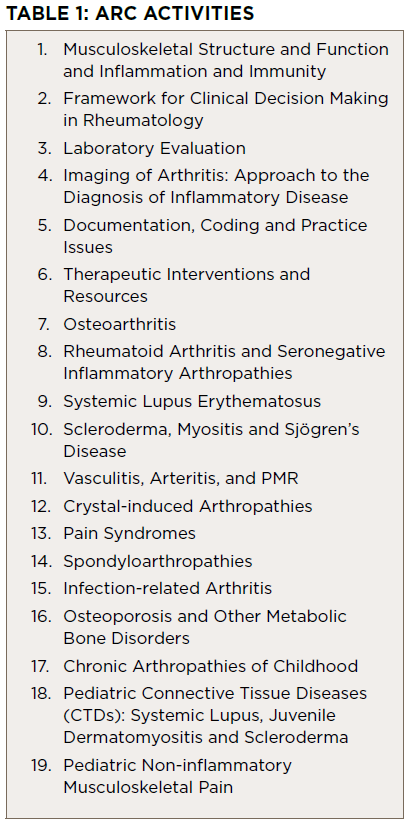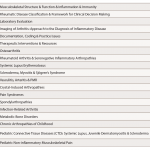 The ACR and the ARP are preparing to relaunch the Advanced Rheumatology Course (ARC) with a fresh look and an enhanced format to facilitate the learner experience.
The ACR and the ARP are preparing to relaunch the Advanced Rheumatology Course (ARC) with a fresh look and an enhanced format to facilitate the learner experience.
Since its debut, the ARC, formerly the Nurse Practitioner and Physician Assistant Postgraduate Rheumatology Training Program, has been a valuable resource for hundreds of nurse practitioners (NPs), physician assistants (PAs) and other health professionals who provide care to people with rheumatic diseases. It was launched to support the development of rheumatology professionals to help address the growing gap in supply and demand for rheumatology services revealed in the 2005 and 2015 ACR workforce studies.1-4 The ACR and the ARP developed the Rheumatology Core Curriculum for NPs and PAs beginning a career in rheumatology.5 The ARC supplements the Rheumatology Core Curriculum for NPs and PAs.
The ARC is designed to provide comprehensive, advanced educational content to professionals who wish to expand their knowledge and clinical skill sets in rheumatology with a strong focus on information that will help NPs and PAs contribute to the clinical practice of rheumatology and foster interprofessional collaboration.
The course was created for NPs and PAs, but rheumatology fellows in training, internal medicine residents, medical students, primary care providers and other providers new to rheumatology have found the content beneficial. It is an online, highly interactive, case-based educational tool that can be completed at a learner’s own pace. Activities focus on core rheumatology content and cover both pediatric and adult rheumatic diseases. The activities are narrated by an author and include interspersed knowledge assessments (see Table 1). Learners can complete all 19 activities or select activities that best meet their needs.
With the release of the updated ARC, learners will find a fresh look. While the ARC content presents the latest medical advances in rheumatology, the update also features increased interactive learning opportunities.
The ARC expert authors represent an interdisciplinary rheumatology team, comprising clinicians, educators and other health professionals. Each author creatively shares their knowledge and experience in the ARC activities by reviewing core medical knowledge and describing common case presentations that reinforce foundational knowledge. The ARC editorial team (the authors of this article) coordinated the refresh.
CME
Continuing medical education (CME) credit will be available for those who complete ARC activities.
The Rheumatology Research Foundation offers financial support through two awards for those who wish to complete the ARC: the Mentored Nurse Practitioner/Physician Assistant Award for Workforce Expansion and the Health Professional Online Education Grant.
Still More
The ACR has developed other eLearning activities for the rheumatology community, including the Fundamentals of Rheumatology Course (FRC). The FRC is a series of 10 online learning activities designed to provide foundational knowledge and develop needed skills so professionals new to rheumatology can succeed in clinical practice. The course provides information on signs and symptoms of, and treatments for, the most common forms of rheumatic disease and addresses pain management, psychosocial challenges, rehabilitation and self-management support strategies and more. This course is also useful for experienced rheumatology professionals looking for a refresher on key practice areas.
 Benjamin J. Smith, DMSc, PA-C, DFAAPA, is the program director and associate dean of the Florida State University College of Medicine School of Physician Assistant Practice, Tallahassee, Fla.
Benjamin J. Smith, DMSc, PA-C, DFAAPA, is the program director and associate dean of the Florida State University College of Medicine School of Physician Assistant Practice, Tallahassee, Fla.
 Marcy B. Bolster, MD, is a professor of medicine, Harvard Medical School, Boston, and the director of the Massachusetts General Hospital Rheumatology Fellowship Training program. She is currently a member of the ACR Board of Directors.
Marcy B. Bolster, MD, is a professor of medicine, Harvard Medical School, Boston, and the director of the Massachusetts General Hospital Rheumatology Fellowship Training program. She is currently a member of the ACR Board of Directors.
 Sonam Kiwalkar, MD, FACP, is a clinician educator and the associate program director of the internal medicine residency training program at the Legacy Salmon Creek Medical Center, Vancouver, Wash.
Sonam Kiwalkar, MD, FACP, is a clinician educator and the associate program director of the internal medicine residency training program at the Legacy Salmon Creek Medical Center, Vancouver, Wash.
 Julie Lahti is a medical editor, writer and content creator in Roswell, Ga.
Julie Lahti is a medical editor, writer and content creator in Roswell, Ga.
 Anneke Smith is a medical editor and writer in Marietta, Ga.
Anneke Smith is a medical editor and writer in Marietta, Ga.
 Sharon Ross is a project manager and eLearning professional for the ARP and has been employed by the ACR for 16 years.
Sharon Ross is a project manager and eLearning professional for the ARP and has been employed by the ACR for 16 years.
Disclosures
Dr. Bolster has received honoraria from Elsevier and ABIM. She is a recipient of the Clinician Scholar Educator Award from the Rheumatology Research Foundation.
Dr. Kiwalkar is a recipient of the Clinician Scholar Educator Award from the Rheumatology Research Foundation.
References
- Deal CL, Hooker R, Harrington T, et al. The United States rheumatology workforce: Supply and demand, 2005–2025. Arthritis Rheum. 2007 Mar;56(3):722–729.
- Battafarano DF, Ditmyer M, Bolster MB, et al. 2015 American college of rheumatology workforce study: Supply and demand projections of adult rheumatology workforce, 2015–2030. Arthritis Care Res (Hoboken). 2018 Apr;70(4):617–626.
- Solomon DH, Bitton A, Fraenkel L, et al. Roles of nurse practitioners and physician assistants in rheumatology practices in the US. Arthritis Care Res (Hoboken). 2014 Jul;66(7):1108–1113.
- Solomon DH, Fraenkel L, Lu B, et al. Comparison of care provided in practices with nurse practitioners and physician assistants versus subspecialist physicians only: A cohort study of rheumatoid arthritis. Arthritis Care Res (Hoboken). 2015 Dec;67(12):1664–1670.
- Smith BJ, Bolster MB, Slusher B, et al. Core curriculum to facilitate the expansion of a rheumatology practice to include nurse practitioners and physician assistants. Arthritis Care Res (Hoboken). 2018 May;70(5):672–678.


